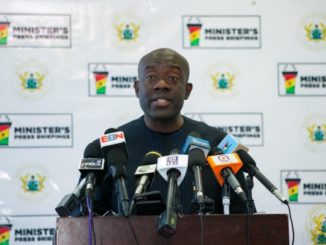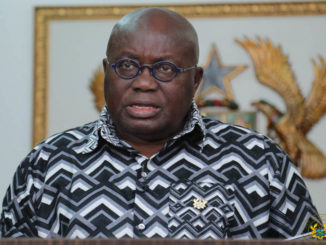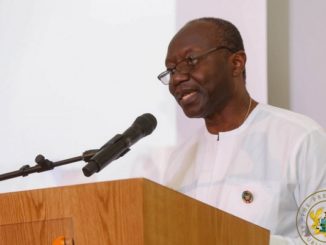MINORITY’S REACTION TO THE BANK OF GHANA’S PRESS RELEASE ON STATEMENTS DESCRIBING THE INTRODUCTION OF NEW HIGHER GHANA CEDI DENOMINATION BANKNOTES AS AN ‘AMBUSH’
On January 3, 2020 the Bank of Ghana issued a Press Release on alleged statements describing the introduction of new higher Ghana cedi denomination banknotes as “ambush”.
This was an apparent reaction to a comment by former President John Mahama that the introduction of the new notes was done on the blind side of Ghanaians. The comment was made in his speech at the 38th commemoration of the 31st December Revolution in Winneba.
The Minority wishes to state the following :
1. The Former President’s comments only re-echoed the views of many Ghanaians who have expressed concerns about the manner in which the new higher denomination notes have been introduced. Indeed some of the banks are even rejecting deposits using the new denominations because their systems are yet to be reconfigured to validate the notes. Only last week, cashiers at Game, a shopping centre also rejected payments from a customer using the ₵200-note.
2. The Former President has legitimate responsibility to comment on issues of national interest and only emphasized the need for adequate sensitization and to always follow laid-down procedure in introducing new currency notes in order to preserve confidence in such notes.
3. Apart from the issues raised by the Former President, the Minority in Parliament in a recent Press statement outlined several lapses and substantive issues relating to the exercise. It was made clear for example that if the purpose for introducing the notes was to exploit seigniorage revenues or profit (seigniorage is the difference between the face value of money, and the cost to produce it) to support government finance, then this purpose will be defeated because it will result in high inflation. Already, the Bank of Ghana incurs a high cost of monetary operations to maintain price stability and hence no reason for the Bank to shoot itself in the foot.
4. The Minority also pointed out that Ghana’s exchange rate regime is not a dollar-peg and hence wrong for the Bank of Ghana to state that the higher value denominations will partially restore the dollar value of the currency notes to levels in 2007. The Minority Statement further explained that countries across the world were rather eliminating high value notes to prevent these from fuelling illegal activities, and that simply increasing the currency bound would not increase Ghana’s economic fortunes.
5. Unfortunately, last Friday’s reaction from the Bank of Ghana still mentioned reasons such as deadweight burden in carrying large sums of money. Deadweight issues arise following sustained periods of high inflation, and with recent inflation reported to be coming down, one would rather expect the deadweight burden to disappear without the need to introduce high value denominations.
6. It is true that central banks across the world do undertake periodic reviews of the structure of existing currencies for various reasons. That was why the exercise was begun in early 2016 with new designs (featuring some of our national heroes) that have unfortunately been discarded by the current administration. The plan for the new currency structure was to move the coin/note boundary by a step such that the ₵1 note will be phased out and the ₵2 note would be the new boundary. The rest of the structure was maintained because the ₵50 note does not circulate much in the non-urban areas in particular.
7. Moreover, with the advances in payments systems across the country as well as digital finance, coupled with the move toward promoting a cash-lite society, there was no need to introduce a higher denomination beyond the ₵50 note.
8. Thus the denomination structure comprising the ₵2-note, ₵5-note, ₵10-note, ₵20-note, and ₵50-note still aligns well with the needs of Ghanaians who use it for their daily transactions. There is no need to add ₵100 and ₵200.
9. In 2016, a number of state-of-the-art security features were introduced for the new designs and hence it is not true that the review of the structure of the currency only started in 2017. Also, it cannot be true that there is significant increase in the demand for higher denomination banknotes even in the non-urban areas of the country.
10. The Minority is however happy to hear that the positive legacies of Former President John Dramani Mahama continue to speak for themselves everywhere. The Bank of Ghana’s new Cash Centre in Accra was built under his guidance and specifically commissioned on December 2, 2015 by the Former Vice President, His Excellency KB Amissah-Arthur. According to the Bank of Ghana, the Cash Centre has continued to receive several commendations and has become a model for peer economies that have visited the country to learn from Ghana’s currency management system.
11. The Minority is particularly happy to hear that countries such as Kenya, Sierra Leone, Liberia, Uganda, Nigeria, South Africa, Seychelles, India, Mozambique and many more countries in Africa and Middle East have visited last year to learn from the Cash Centre built during Prez John Mahama tenure in office.
12. Regarding the context of the Eco currency which the Government of Ghana has in a recent statement committed to join, the Bank of Ghana and Government cannot be speaking different languages. Even if Ghana opts to adopt the Eco after three (3) years or even more, the fact still remains that the new higher denominations could have been shelved until the Eco is introduced.
13. The Minority wishes to reiterate the point made by the Minority leader that,the introduction of the higher value notes would be thoroughly investigated by the next NDC government.
Cassiel Ato Forson MP,
AJUMAKO/ ENYAN/ ESSIAM AND RANKING MEMBER, FINANCE COMMITTEE OF PARLIAMENT.
Date: 6th January, 2020



